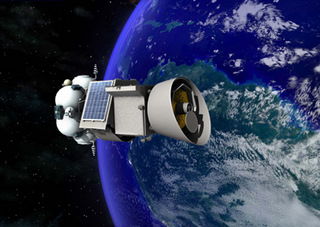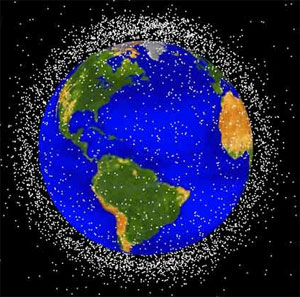|
Missing Space Probes & Satellites

Satellite
circling Earth
Star Wars &
Satellites
The Face On Mars
Aliens On The Moon
The
Universe
Missing
Space Probes
and Satellites:
March 28,
1989
The Russian Probe,
Phobos 2 was lost under mysterious and
unexplained circumstances. Russian Colonel Marina Popovich has since
stated
that Soviet missions had determined that the probe's namesake, Phobos
2, one of
the moons of Mars,
is in fact artificial and hollow.
January 29,
1992
The Office of
Strategic Defense Initiative (Star Wars)
convinces NASA to send an unmanned probe to the moon. The probe,
"Clementine I," is launched into a polar orbit around the moon.
Because of it's high orbit it is able to map almost the entire surface
of the
moon. Scientists are shocked to find that the surface variation in
topography
is up to twelve miles, not five miles as previously believed. They
discover
that some of the moon's mountains are a half-mile taller than Mount
Everest,
the highest mountain on earth. Clementine orbits around the moon for
seventy-four days and then malfunctions.
September
1992
The Mars Observer is
launched. The Observer is designed
to provide an extremely detailed mapping of the entire surface of Mars
using
the latest technology, including short laser bursts bounced off the
surface for
pin-point accuracy. Originally, NASA has no plans to put a camera on
board.
Why? Nonetheless, scientists fight NASA like cats and dogs. They win
and an innovative
new system of cameras is installed.
August 21,
1994
The Jet Propulsion
Laboratory loses contact with Mars
Observer just hours before it was scheduled to begin orbiting the Red
Planet.
This was the first failure of its kind in seventeen years. Several
different
reasons are given for the loss of the Observer, but no really knows
why. The
Mars Observer is never heard from again.
January 14,
1994
A NASA investigatory
panel announces, "No one will
probably ever know exactly what happened to the spacecraft." The
panel's
attempt to understand the Observer's silence was hindered because the
spacecraft telemetry was turned off before the pressurization of its
fuel tanks
as it prepared to enter orbit around Mars.

Man made space debris in Earth's orbit
January 1994
Turkish TURKSAT I and
BULSAT I communications satellites
are lost when a French Ariane launch vehicle's third-stage propulsion
system
fails.
July 1995
China loses its
Apstar-2 satellite when launch vehicle
explodes. Hughes Space and Communications Company and Great Wall
Industrial
Corporation disagree as to the cause of the explosion.
April 1995
United States
satellite NOAA 13 vanishes from orbit.
November 17,
1995
Russia's Mars space
probe is lost when a booster
malfunctions and falls back to earth carrying 270 grams of live
plutonium.
Two years later, health officials attribute a worldwide increase in
lung cancer
rates to highly active radioactive material being disbursed into the
atmosphere
from falling and disintegrating satellites.
November 22,
1995
Two Russian spy
satellites are announced to have been
lost by the Russian Embassy. (Don't
you just love it, both the U.S. and Russia now "announce" the
launching of "spy" satellites?)
December,
1995
Launch of Athena
rocket from Vandenderg Air Force Base
fails.
September
1996
The Cosmos 1275
satellite disintegrates. The crash is
attributed to a collision with space debris.
July 1997
Lewis satellite
fails
after being launched from
Vandenberg on an Athena rocket.
December 25,
1997
The final booster on a
Russian-made Proton-K rocket
fails. The "communications" satellite it was carrying falls into an
orbit of only 125 miles up instead of the 22,500 mile-high orbit it was
planned
for. The lower orbit makes the satellite totally useless and subject to
falling
into the atmosphere and burning up.
Astronaut Statements
Aliens & Astronauts
Nikola Tesla
Home Page

|



